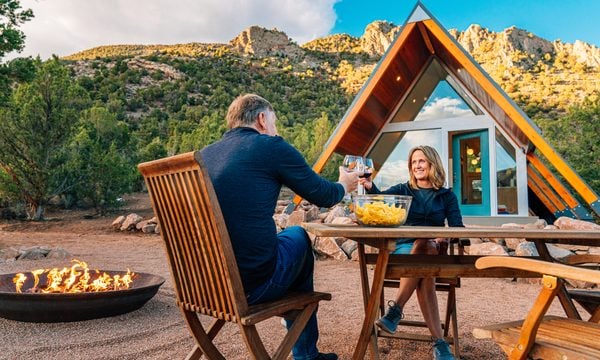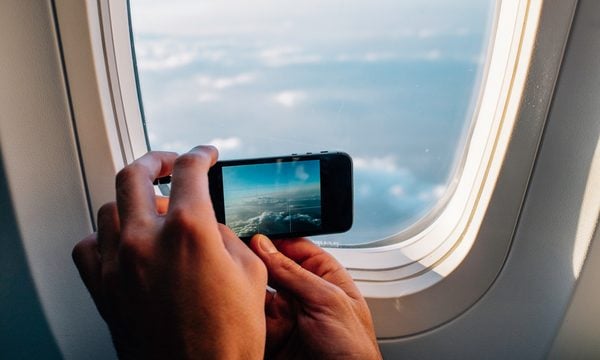What to Know Before You Book an Airbnb
Airbnb has made home sharing more accessible for travelers, and it can be a good option if you find ways to save.

Many or all of the products on this page are from partners who compensate us when you click to or take an action on their website, but this does not influence our evaluations or ratings. Our opinions are our own.
Lodging during your vacations or business trips doesn’t necessarily have to be a standard hotel, bed and breakfast or campground. These days, more and more travelers are staying at someone’s house, coordinated through home rental sites like Airbnb.
Renting a vacation home via Airbnb can sometimes be the cheapest option. What’s more, on Airbnb you’ll typically have better luck finding more beds in the same unit than you’d find in a hotel room. Airbnbs often tend to include couches or futons so you can sleep more people. They typically have washing machines and kitchens to better accommodate extended stays, giving travelers the option to save a little money by cooking at home.
Airbnbs are also often located in places that might not have many hotels to choose from, providing you with more lodging options (and sometimes the only lodging option). And many properties are delightfully unexpected. There are treehouses, lighthouses and geodesic domes for rent, and there’s even a replica of The Hundred Acre Wood near London.
But Airbnbs also have challenges. Check-in processes are inconsistent, as some hosts make you meet up with them in-person to exchange keys while other units unlock remotely so you never meet the owner. Policies, for instance about parties and cancellations, vary by property. There are tons of fees (which again, vary by property). Couple that with Airbnb’s lack of a loyalty program, and the platform sometimes doesn’t net out to be any cheaper than hotels.
But if the vacation home life is the life for you, here’s what you need to know about renting an Airbnb.
Get the 'Cheat Codes' to Cheaper Travel
Unlocking the secret to saving a ton on travel is easier than you think. 📤 Our free newsletter shows you how in 5 min. or less.

How does Airbnb work?
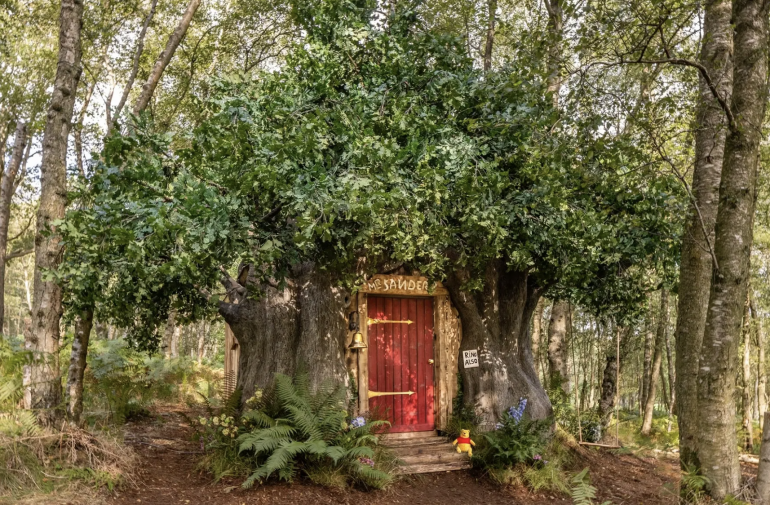
Airbnb launched in 2007 as an online, peer-to-peer home rental service, when its founders were seeking a way to help pay their rent — in this case renting out a portion of their home to someone else. CEO and co-founder Brian Chesky inflated three air mattresses to make what was the first-ever Airbnb listing, and today there are millions of listings worldwide (and you can actually still book a room in Chesky's own house, though it's rarely actually available to book).
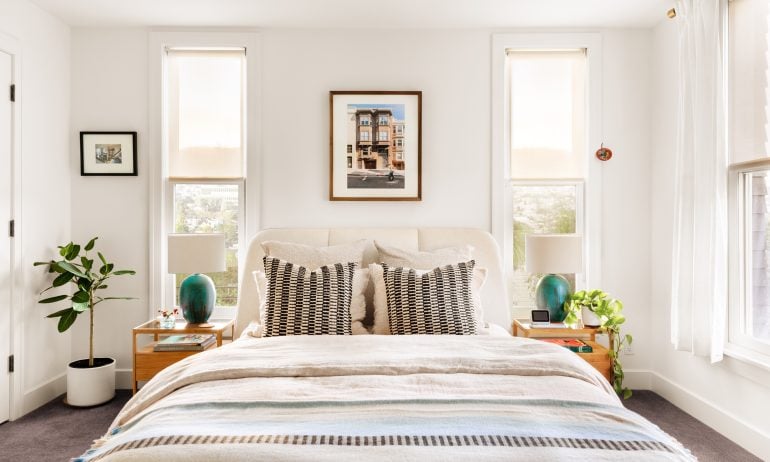
The premise of Airbnb is simple: A person lists their home for rent, sets available dates and the price, and you can opt to rent it. Some listings give you the entire home to yourself, while others provide private areas within a home (such as an in-law unit). Sometimes, you might even share a room with someone else.
Listings vary across pretty much every aspect of your stay, including amenities offered, cancellation policies and the number of guests allowed to stay. But Airbnb’s platform has about 4 million hosts across 220 countries and regions, so there’s a good chance you’ll find an Airbnb that matches your needs.
According to vacation rental analytics company AirDNA, travelers can expect more rental options in 2026, particularly in coastal areas and suburbs near major cities, as more professionally managed properties come online.
How to make an account on Airbnb
To get started on Airbnb, you’ll need to create an online account, which usually entails more than just a name and email address if you want to book a stay. You’ll typically have to upload your government ID, which Airbnb requires for security (after all, you’re staying in someone else’s house, and sometimes even with them or other guests present).
Accepted forms of identification include a driver’s license, passport, identity card or visa. Airbnb says it does not share your ID with anyone else who uses Airbnb, including hosts.

How to book an Airbnb
Finding your rental
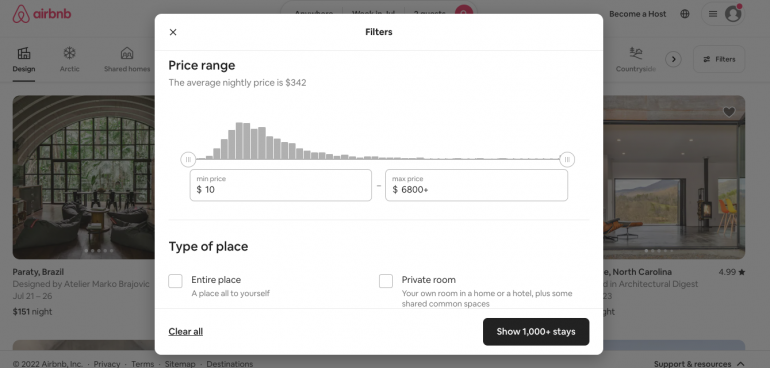
Booking an Airbnb is fairly straightforward. The website offers robust filters, so you can narrow down rentals based on available dates and number of guests, and other features like whether the rental offers amenities like cribs, accessible showers or free parking.
In May 2022, the company launched its Airbnb Categories feature which gives you the option to browse properties by some more nebulous criteria. Rather than searching for a specific city or region, you can see properties all around the world that fall into categories like "OMG!" (for weird and whimsical homes) or "Grand Pianos" for, well, homes with grand pianos. Other categories include homes with chef's kitchens, homes located near national parks and, simply, yurts. The Categories feature has caught on, and at the end of 2022, Airbnb launched six new categories for you to browse through: Trending, Adapted, Play, Hanoks (which are traditional Korean homes), New and Top of the World (indicating homes at least about 10,000 feet above sea level or higher).

Most listings include multiple photos, detailed descriptions and reviews to give you a solid idea of what you’re in for. If there aren’t many high-quality photos, or there are no reviews, be cautious. It could simply be a brand-new listing and just fine, but it might also be a warning sign.
Read the descriptions carefully, as they typically detail important information such as pet rules, noise rules and limits on guests. Some owners also require you to sign separate contracts or rental agreements outside of the standard Airbnb contracts, which will typically be spelled out in the description as well. Airbnb has features that let you message the host before booking if you’re unsure about something.
If you're planning a longer trip, you might want to take advantage of Airbnb's Split Stay feature. Split Stays give guests the opportunity to split a longer trip between two properties. Individually, those properties might not allow for a long enough stay to match your trip needs, but Split Stays (which will appear in location-specific search results as well as certain categories) provides travelers with automated suggestions for coordinating lodging on a longer trip.
When you’ve found your rental of choice, the actual booking process varies. Some homes let you book instantly, while other homes require you to send the owner a request for approval.
Booking and paying for your Airbnb
Once accepted, you’ll be charged for the reservation. If your rental requires a request for approval and the owner either declines or doesn’t respond, you won’t be charged.
All payments are handled via Airbnb. Acceptable payment methods in most countries include major credit cards (like Visa, Mastercard and American Express), most debit cards that can be processed as credit cards and other payment services like PayPal, Apple Pay and Google Pay. If you find yourself in a situation where the host is asking to be paid separately (such as through a Venmo payment or bank transfer), it could be a scam.
The actual time of when you need to pay varies depending on location and length of stay. Most properties let you pay via a payment plan, where you pay a portion upon confirmation, and the rest is automatically charged upon checkout.
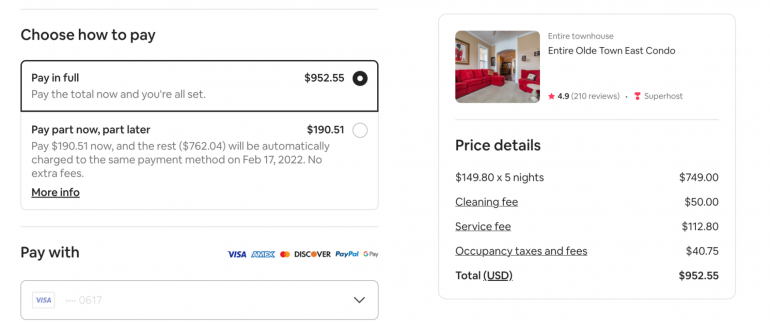
Between acceptance and your trip date, you’ll be able to chat with your host within the Airbnb app or website. You might find that feature handy to coordinate check-in times, or simply to find out more details about amenities (for example, you might want to know whether the kitchen is stocked with certain cookware).
Check in processes vary from Airbnb to Airbnb
Checking in to an Airbnb can sometimes be the biggest adventure of your trip. Unlike a hotel where there’s typically someone working at the front desk 24/7 to issue your key, Airbnb check-in policies vary widely by property.
In-person key exchanges: The most conventional method is meeting up with your host face to face, where they’ll likely hand you the keys and show you around the property. Some property tours might last only a couple of minutes but be prepared: Properties with more complicated features, such as guard gates or even an oddly designed shower, can entail a longer tour. Budget enough time between check-in and your next vacation adventure just in case.
Be aware that check-in may require some thoughtful coordination if the host isn’t planning on waiting at the property for your arrival. If you’re trying to text a host to meet up in a foreign country, ensure you have adequate international cell phone coverage or access to Wi-Fi so you can actually chat, especially if your transportation is delayed and you’ll have to meet up later than expected.
Other possible check-in methods that might not require you to meet the host include:
- A host leaves instructions to enter (e.g., the key is under this flower pot).
- Keys are left in a numbered lockbox, and the host messages you with the code.
- A neighbor, co-host or building doorperson meets you.
Typically, the host will message you with check-in details 48 hours prior to your trip via the Airbnb app or website.
You may have to clean up before checking out of your Airbnb
Just as the check-in process varies by property, the checkout process varies, too. Some hosts have specific cleanup instructions, such as asking you to put used towels and sheets in the laundry room or to start the dishwasher. Other hosts let you leave the house as-is and handle cleanup themselves.
The majority of hosts also charge cleaning fees, which are a one-time charge pocketed by hosts to cover costs such as doing laundry or scrubbing toilets between guest stays. They’re separate from the base price and are in addition to service fees or charges for optional add-ons. While Airbnb maintains that the average cost of the fee is less than 10% of your total reservation, a NerdWallet analysis of Airbnb cleaning fees found that the median cleaning fee was $75 per stay.
It's not entirely clear at booking how much you'll be on the hook for cleaning. However, Airbnb said it eventually plans to require hosts to post the cleaning requirements on the listing before guests book. Guests will also be able to leave feedback on the checkout process (and have an avenue to complain if the cleaning process is too onerous).
The process for locking up will also vary. If you met your host in person for check-in, you might also meet them to check out. Other hosts might ask you to lock the door behind you and throw the key through a slot in the door, or to return it to the lockbox you initially got it from.
Your host will likely share the specific checkout details either before or upon arrival.
Is Airbnb safe?
Airbnb certainly has safety measures in place, but the company isn’t immune from challenges that come from a service where you enter a stranger's home.
Safety measures between guests and hosts
Airbnb conducts background checks on guests and hosts. It uses machine learning to analyze data with the intent to spot suspicious activity such as fraudulent listings. And because Airbnb acts as the intermediary in handling the transaction, your account and payments are more secure than if you were to directly pay the host.
Yet, while there can certainly be shady hotel practices or rowdy guests at any other form of lodging, Airbnb has gotten a hefty amount of bad press when it comes to behavior-related safety issues. Airbnb has experienced what experts have coined the “party house problem,” where large properties morph into sites for raucous parties that sometimes get out of hand. A deadly shooting in 2019 at a Northern California Airbnb made national headlines.
Meanwhile, guests have complained about questionable and sometimes downright dangerous hosts. A 2021 research project at the John Jay College of Criminal Justice and the University of Colorado School of Public Affairs in Colorado Springs, conducted in partnership with data scientist and travel safety expert Asher Fergusson, looked at more than 100,000 public Airbnb guest complaints via Twitter published between January 2015 and September 2020. That study found more than 28,000 complaints around scams, and more than 7,700 complaints about unsafe conditions purely submitted on Twitter.
Safety measures pertaining to property condition
Airbnb has taken some steps to ensure properties are physically safe. It provides smoke and carbon monoxide alarms to hosts at no cost, and you can filter by homes that have one when searching for listings.
However, Airbnb doesn’t necessarily inspect properties for other important safety features that you might expect, such as having at least two exits out of every room, or whether appliances and heating systems are up to code.
And unlike most hotels, most Airbnbs lack features that can keep you safe, including a safe (which you might want to use to stash valuables like jewelry or passports). It also doesn’t offer 24/7 lobby staffing, which could be helpful if you need support from a fellow human in an emergency. Airbnb does, however, offer a 24-hour safety line you can access through the app through its AirCover program, which launched in 2021. AirCover also offers a Get-What-You-Booked Guarantee through which guests can get refunded or switched to a similar property if there's anything materially wrong with the property they originally booked.
Safety measures to protect hosts
Speaking of AirCover, it's there to protect hosts too. AirCover includes guest identity verification and $3 million in damage protection to better protect hosts from issues that guests may cause.
Safety issues can happen at any form of lodging, and Airbnb is generally considered safe. Just be aware that problems can arise, so be aware of scams, unethical practices and physical issues with properties.
How to save money on Airbnb bookings
Since Airbnb prices are set by the hosts, the conventional tricks for saving money on hotels don’t always apply. But there are a few ways to save money on Airbnb rentals, including earning and redeeming credit card points and airline miles on Airbnb stays.
Book a longer stay
Many properties offer discounted rates for longer stays (typically a week or more). Some offer even deeper discounts for stays of a month or more.
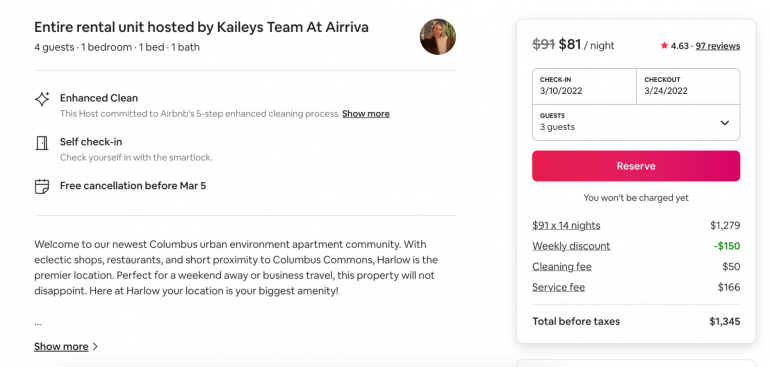
Rather than taking two separate four-day vacations this year, you might consider booking one, eight-day vacation in the same location. You’ll likely save money on not just your Airbnb, but other costs like airfare — and you’ll only have to pack once.
According to a NerdWallet analysis, the nightly rate for a 30-night stay was 46% cheaper per night than a one-night stay.
| Median price per night | Percent cheaper per night versus 1-night stay | |
|---|---|---|
| 1-night stay | $314. | N/A. |
| 7-night stay | $213. | 32%. |
| 30-night stay | $169. | 46%. |
» Learn more: Why it's worth booking Airbnb for a week or longer
Split it with friends or family
Airbnbs are particularly cost-effective for large groups, especially when you compare it to the price of booking multiple hotel rooms.
NerdWallet compared the price per head at Airbnbs with a max capacity of two adults versus a hotel in the same city. It also compared the cost of an Airbnb with a max capacity of six people against the cost to book three hotel rooms (assuming two adults per room).
The average Airbnb for six was 33% cheaper than booking three hotel rooms. But the average hotel was 29% cheaper than booking an Airbnb for two.
Here’s how median costs broke down, per person:
| Median price per night, per person | |
|---|---|
| Small Airbnb (fits 2 adults) | $125. |
| Large Airbnb (fits 6 adults) | $60. |
| Hotel room (fits 2 adults) | $89. |
Book about a month out
NerdWallet compared prices of Airbnbs booked 3 days out, 4 weeks out and 47 weeks out. The Airbnb prices included cleaning fees, long-term discounts and base costs when booking in advance versus short term. Here are our findings:
It turns out that booking an Airbnb four weeks in advance yields the lowest median price — $270.80. This is roughly $30 cheaper than booking it almost a year in advance, and about $50 cheaper than booking it last-minute.
According to AirDNA, nightly rates are expected to rise modestly through 2027, so booking sooner rather than later could help you lock in current prices, particularly in popular coastal destinations and major city suburbs where more properties are coming online.
Redeem travel statement credits for Airbnbs
Some credit cards offer travel statement credits, and those that do typically tend to cover Airbnb stays. In fact, the Chase Sapphire Reserve® offers a statement credit that can be used to offset Airbnb purchases.
Purchase discounted gift cards
Airbnb sells gift cards on its own site, but major retailers that sell gift cards, such as Target, Sam’s Club and Best Buy, often can get you a better deal.
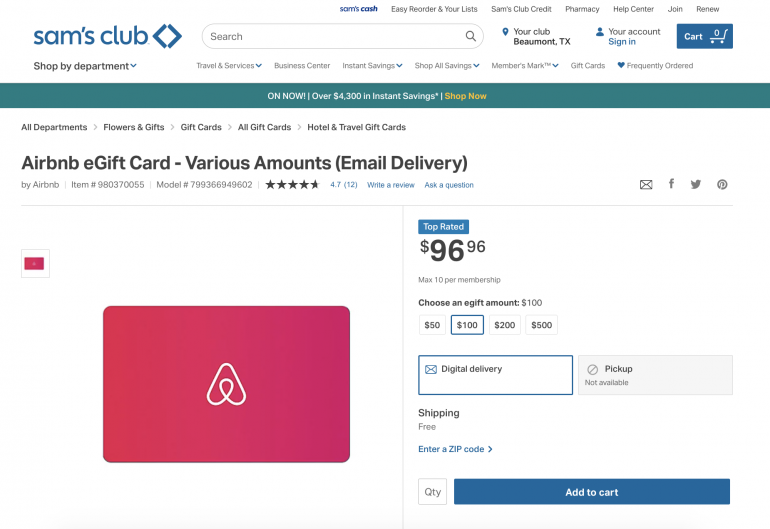
These stores frequently run promotions where they’ll sell you Airbnb gift cards at a lower cost than the gift card’s value. During certain times of year, you might find them sold at a 10% discount, though sometimes the discounts aren’t quite as deep.
Holding certain memberships or credit cards might qualify you for additional discounts. For example, if you purchase an Airbnb gift card from Target and pay with your Target Circle™ Credit Card, you’ll get an automatic 5% discount at checkout (so you’d only pay $95 for a $100 gift card).
Earn points by paying with a travel rewards credit card
This tip won’t necessarily save you money upfront, but it’ll earn you valuable travel currency on the other end. Most credit cards that offer you bonus points on travel classify purchases made through home-sharing platforms like Airbnb in the same way as hotels.
So if you’ve got a travel rewards credit card, use it. And if you don’t have one yet, consider applying for one. While premium travel credit cards can offer big rewards rates for your travel spending, there are plenty of travel credit cards with no annual fee.
Top cards for booking Airbnb stays
Annual fee
$0.
$95.
$395.
$0.
Earn rates
- 1.5 points per $1 spent.
- 3 points per $1 spent on travel purchases booked through Bank of America.
• 5 miles per $1 on hotels, vacation rentals and rental cars booked through Capital One Travel.
• 2 miles per $1 on all other purchases.
• 10 miles per $1 on hotels and rental cars through Capital One Travel.
• 5 miles per $1 on flights and vacation rentals through Capital One Travel.
• 2 miles per $1 on everything else.
• 5 miles per $1 on hotels, vacation rentals and car rentals booked through Capital One Travel.
• 1.25 miles per $1 on all purchases.
Still not sure?
Earn airline miles, too
Your Airbnb stays are an easy way to rack up Delta SkyMiles, which you can accumulate and redeem for free flights. Once enrolled in the program, you’ll earn 1 mile for every dollar spent on qualifying Airbnb reservations, excluding taxes and fees. Note that you'll need to enter your SkyMiles number every time you book.
NerdWallet values a Delta Skymile at 1.2 cents each, so this isn’t necessarily going to make you rich. But, it’s an easy way to accumulate some extra Delta miles with minimal effort.
» Learn more: How to earn or redeem points on Airbnb stays
Travel when no one wants to
Your Airbnb host is likely aware of the principles of supply and demand, and will set rates for specific nights accordingly. A property in New York City with a view of the Times Square Ball will likely be more expensive on Dec. 31 than any other cold winter day.
If you can be flexible, search for the same property across various weekends versus weekdays to spot lower rates. Meanwhile, consider whether you really need to travel during that long weekend when everyone else is off of work and school. Shoulder season also tends to be an excellent time to travel.
Consider Airbnb alternatives
Airbnb's reign over the vacation rental kingdom is undeniable. But between questionable cleaning fees, quirky cancellation policies, and the occasional horror story, even the most loyal Glampacker might start daydreaming of greener pastures.
Whether you just want to comparison shop to ensure you're getting the best deal from Airbnb, or you'd rather swear off Airbnb entirely, there's no shortage of Airbnb alternatives. One of its biggest competitors is Vrbo (consider it the Lyft to Airbnb's Uber). It offers a better browsing experience plus the ability to earn rewards through the One Key Rewards program.
You might also consider Vacasa, which stands out as a full-service vacation rental management company. That means homeowners partnering with Vacasa to have their properties professionally managed (and generally means an overall more polished vacation rental experience while still getting the unique, hometown feel of renting a home from its actual owner).
Frequently Asked Questions
What does Superhost mean on Airbnb?
Superhost is a designation Airbnb gives to certain hosts who have high ratings, low cancellation rates and host frequently. Consider it an added layer of confidence that your rental will be a positive experience should you rent from a superhost.
Airbnb offers a filter that allows you to narrow your search exclusively to properties from superhosts. Superhosts also have a badge on their profile that indicates their status.
How do I contact Airbnb with an issue?
If something is wrong at check-in, Airbnb first recommends reaching out to the host to solve the problem. If that doesn’t work, or you have another issue that the host can’t resolve, then use Airbnb’s Contact Us page to report your issue online.
Airbnb also has a chat bot, which you can find on the inbox feature on your account. That can get you quick answers to simple issues, or can connect you to a human support staffer if necessary.
If you're unable to check-in for whatever reason, and the host is unable to address the issue, Airbnb's new Check-In Guarantee means the company will either refund you or will find you a similar home for the length of your booking.
If it’s truly an emergency that impacts your personal safety, skip trying to reach out to Airbnb and instead contact local police or emergency services immediately.
How old do I have to be to rent on Airbnb?
You must be at least 18 years old to create an account to travel or host on Airbnb.
How do I cancel an Airbnb reservation?
To cancel your Airbnb reservation, go to the “Trips” tab, then select “Show more trip plans.” From there, navigate to “Show details,” where you’ll be able to change or cancel your reservation.
Cancellation policies vary by property, but they’ll be spelled out on the listings page so you can see them before you book and pay. The most flexible Airbnb cancellation policies let you cancel up until 24 hours before check-in for a full refund. Meanwhile, other listings are completely nonrefundable.
If a host cancels your booking within 30 days of check-in, Airbnb will find you a similar home or provide a refund, depending on availability, through its new Booking Protection Guarantee.
Photo courtesy of Airbnb.
How to maximize your rewards
You want a travel credit card that prioritizes what’s important to you. Here are some of the best travel credit cards of 2026:
- Flexibility, point transfers and a large bonus: Chase Sapphire Preferred® Card
- No annual fee: Wells Fargo Autograph® Card
- Flat-rate travel rewards: Capital One Venture Rewards Credit Card
- Bonus travel rewards and high-end perks: Chase Sapphire Reserve®
- Luxury perks: American Express Platinum Card®
- Business travelers: Ink Business Preferred® Credit Card
Article sources
NerdWallet writers are subject matter authorities who use primary,
trustworthy sources to inform their work, including peer-reviewed
studies, government websites, academic research and interviews with
industry experts. All content is fact-checked for accuracy, timeliness
and relevance. You can learn more about NerdWallet's high
standards for journalism by reading our
editorial guidelines.
Limited Time Only: Earn $1,000 Toward Travel!
Capital One Venture Rewards Credit Card 
Travel

For a limited time, the
Capital One Venture Rewards Credit Card is offering new cardholders an especially rich bonus: Enjoy $250 to use on Capital One Travel in your first cardholder year, plus earn 75,000 bonus miles once you spend $4,000 on purchases within the first 3 months from account opening - that’s equal to $1,000 in travel!
More like this
Related articles







